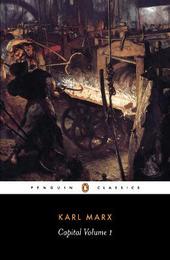
|
Capital: Volume I
Paperback / softback
Main Details
| Title |
Capital: Volume I
|
| Authors and Contributors |
By (author) Karl Marx
|
|
Introduction by Ernest Mandel
|
|
Translated by Ben Fowkes
|
| Series | Capital |
|---|
| Physical Properties |
| Format:Paperback / softback | | Pages:1152 | | Dimensions(mm): Height 198,Width 129 |
|
| ISBN/Barcode |
9780140445688
|
| Classifications | Dewey:335.4 |
|---|
| Audience | |
|---|
|
Publishing Details |
| Publisher |
Penguin Books Ltd
|
| Imprint |
Penguin Classics
|
| Publication Date |
6 December 1990 |
| Publication Country |
United Kingdom
|
Description
One of the most influential political and philosophical texts ever written One of the most notorious works of modern times, as well as one of the most influential, Capital is an incisive critique of private property and the social relations it generates. Living in exile in England, where this work was largely written, Marx drew on a wide-ranging knowledge of its society to support his analysis and generate fresh insights. Arguing that capitalism would create an ever-increasing division in wealth and welfare, he predicted its abolition and replacement by a system with common ownership of the means of production. Capital rapidly acquired readership among the leaders of social democratic parties, particularly in Russia and Germany, and ultimately throughout the world, to become a work described by Marx's friend and collaborator Friedrich Engels as 'the Bible of the Working Class'
Author Biography
Karl Marx was born in 1818 in Trier, Germany and studied in Bonn and Berlin. Influenced by Hegel, he later reacted against idealist philosophy and began to develop his own theory of historical materialism. He related the state of society to its economic foundations and mode of production, and recommended armed revolution on the part of the proletariat. Together with Engels, who he met in Paris, he wrote the Manifesto of the Communist Party. He lived in England as a refugee until his death in 1888, after participating in an unsuccessful revolution in Germany. Ernst Mandel was a member of the Belgian TUV from 1954 to 1963 and was chosen for the annual Alfred Marshall Lectures by Cambridge University in 1978. He died in 1995 and the Guardian described him as 'one of the most creative and independent-minded revolutionary Marxist thinkers of the post-war world.'
|